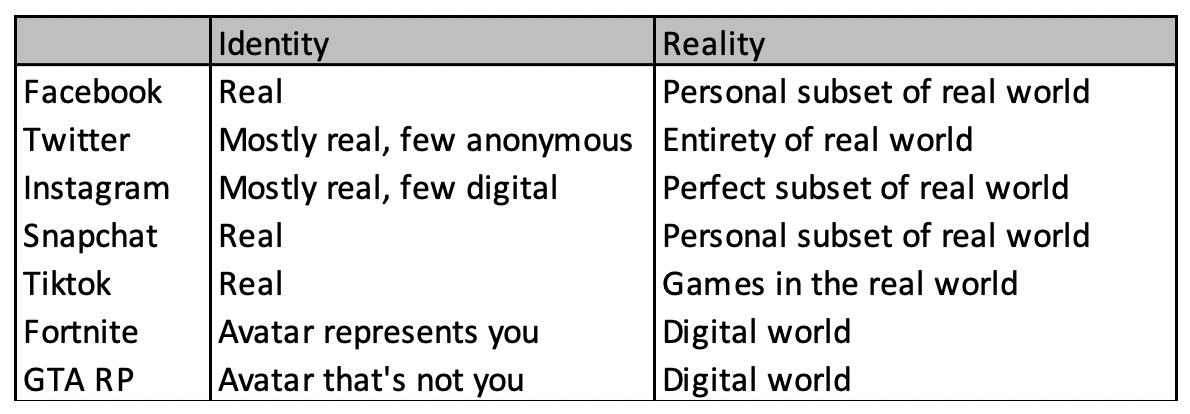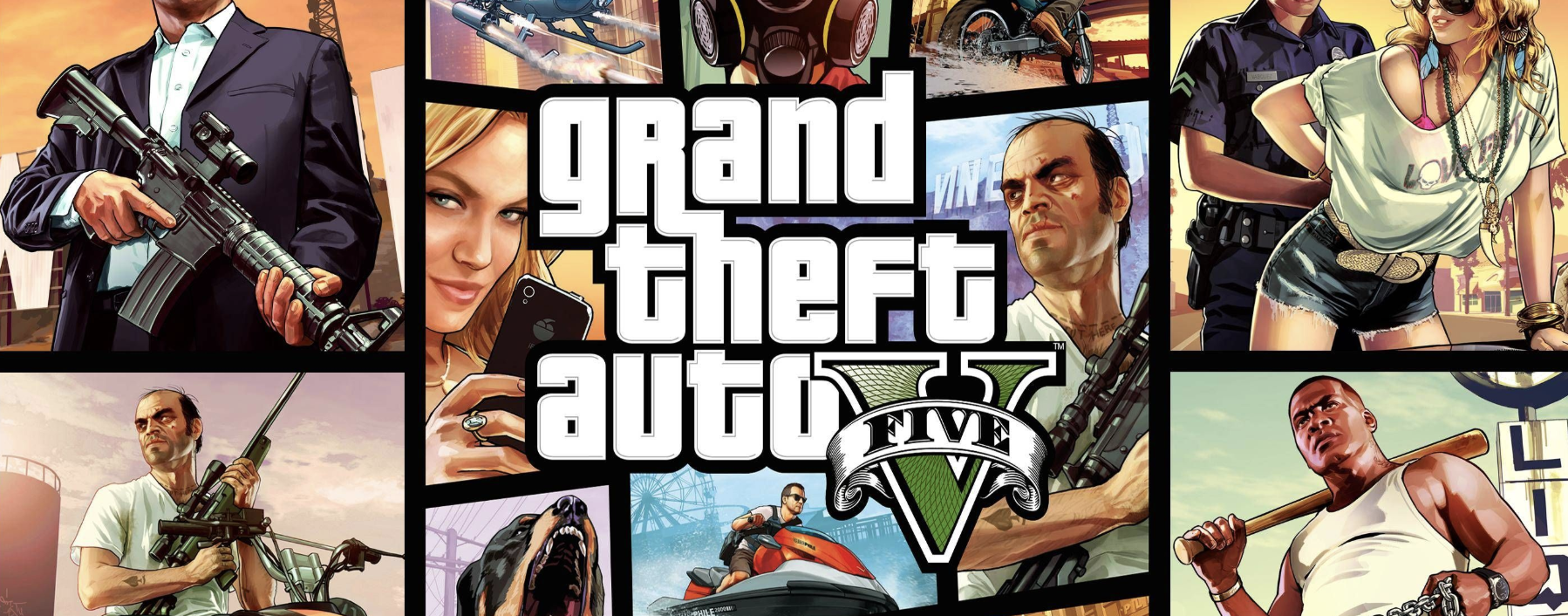All meaningful social internet platforms are worlds that merge elements of identity and reality so users can interact in a compelling way. Identity is the character that users play in the world. Reality is the shared context and understanding that fuels user interaction in the world. Watchability is the quality of the interactions on the platform.
Facebook as a world merges your real identity with the context of the real world via your social network. It creates a place for you to interact with your family, friends, and people you don’t know to discuss what’s happening in your shared reality. The degree of connection to those you interact with creates watchability.
Instagram as a world merges a version of your real identity, the perfected version, with the context of things you’re doing in the perfect version of your real world. Family, friends, and people you don’t know can praise you for things you do in real life. The degree of perfection of what you’re sharing creates watchability.
Fortnite as a world merges an avatar you play with your real identity with a purely digital world. You can squad up with friends to hang out in the digital world, and you can interact with others by trying to beat them at the game. The degree of skill at the game creates watchability.
In hindsight, if social internet platforms as worlds is axiomatic, it was inevitable that social networks and games, which are virtual worlds, would intersect. The simple liking and favoriting mechanics of Facebook and Twitter are only indirectly game-like, but Snapchat leverages streaks, a direct game mechanic, to great success. TikTok is a world of users playing IRL games. Fortnite is a game.
The progression from Facebook to Fortnite teaches us about where the next major social platform may come from. I think it will be an evolution on both identity and reality as a game. The aging Grand Theft Auto 5 (GTA 5) shows us what it might look like.
Role Play
GTA 5 has recently become one of the most-watched games on Twitch despite being more than six years old. As of today, GTA 5 is the sixth most-watched game on Twitch. The resurgence of the game is built on the work of an active role play community which began gaining attention this past March. Modders serve versions of GTA 5 (GTA RP) with specific role play rules where multiple players can play the game together as characters in Los Santos (GTA’s fictional city).
In the context of our identity/reality paradigm, GTA RP merges an avatar as a character that you develop, not your real self, with a purely digital world. The spontaneity and hilarity of interactions with other users in the digital world creates watchability.
Eliminating the Limitations of Identity
To date, no mass adopted social media platform is built for users to play characters other than themselves.

The alternate-identity hole in the social landscape will ultimately be filled, whether by GTA RP or something else, as the natural evolution of social. Worlds based on a user’s real identity are well addressed across various realities. At this point, you could argue identity is becoming more of a rigid barrier to expression on social media than an asset. Because every platform leverages a user’s real identity, tribalism prevents users from deviating from preconceived notions of themselves to explore the world in different ways.
By playing a character that is not him or herself in a world not tied to reality, users are free to explore social expression in ways not comfortable or possible before.
To enable this type of reality, it requires a compelling digital world where users can have deep enough interactions with other characters. GTA 5 likely cost over $250 million to develop and market (split around equally) and is one of the most successful games of all time with over 110 million copies sold. Fortnite, by comparison, has had over 250 million people download its free-to-play game and likely cost tens of millions of dollars to develop and update, if not more.
If alternate identities and worlds are the next evolution in social, they may have to be driven by game developers given how expensive compelling digital worlds are to build and maintain.
Watchability
The skeptic might say that virtual worlds similar to GTA RP have existed for years without mass adoption. The reason prior virtual worlds have failed as mass adoption social platforms is because they weren’t watchable. Users either had to participate or they didn’t interact with the world.
Watchability is the entertainment and/or utility value a social network provides a user without their active participation. Participation inequality online — where roughly 1% of users are active creators, 9% are occasional creators, and 90% rarely or never create — dictates the importance of watchability. Engaging the 90% that doesn’t participate is required for a social platform to thrive, otherwise there’s no real mechanism for social currency that Eugene Wei so perfectly describes in his Status as a Service piece.
On Facebook and Twitter watchability is conveyed through the currencies of the platforms — likes, favorites, retweets, etc. In Fortnite, a user’s skill at the game can make them more attractive to play with or watch as a spectator either in person with friends or via Twitch. Similarly, in GTA RP, skill at portraying a character will encourage other characters to interact with you or watch as a spectator via Twitch.
Why is GTA the Right Digital World?
Whether intentional or by accident, the early online role play community has chosen GTA as their platform of choice. There are several reasons this may be the case: large familiarity with the GTA world given over 100 million users, a world that expects tension of “good and bad” through police and criminal characters, and GTA is close enough to the real world in mechanics that it’s easy to understand (characters can go to the bank, they need to eat food, they can take out loans, etc.).
GTA also has permanence built into the world — i.e. when a character buys something or does something or has a criminal record, it travels from session to session. Permanence lays the groundwork for a functioning economy within the world. Given a functioning digital economy, characters can earn and display status within the game parallel through exogenous status that comes from watchability.
Fortnite, by contrast, doesn’t work well as a world for role play because the world resets for every session. When the battle royale is over, the world resets, thus there is no ability to really build an identity, or economy, over time. World of Warcraft has some permanence built into its world, but the fantasy-style nature of the world means you have to learn how a new world works and create a character in it. With GTA, the digital world is based on the real world, so users can focus purely on character.
I’m not sure whether TakeTwo realizes that they have an inside track to the next great social network. Whether they believe this is something a large user base might want or not, the company should support role play in future releases as a built-in feature, extend it to mobile, and make it easier to stream. If nothing else, embracing role play would create a more dynamic gaming experience for users and extend the life of games because characters played by other people will always be more compelling that those played by AI. The functioning digital economy would give players more reasons to spend real money on digital goods to speed up in-game status. It might even evolve into the type of virtual world real people have been talking about for years.
Conclusion
With our real identities stretched across so many platforms, some social platform will emerge to allow users to explore alternate identities. Current social platforms aren’t built to explore alternate identities because they’re too connected with our true identity — the identity we most closely associate with and present to the world.
The Rock, real identity Dwayne Johnson, has said that The Rock is a character based on himself turned up to 10. The WWE is about characters telling stories. Writers describe characters living in their heads. Actors play characters based on scripts. Live action role players play characters with groups of strangers. Humans are built to explore different identities or enjoy watching others do it.
We all have characters inside of us. Social media democratized self-expression first. It will democratize alternate self-expression next.
